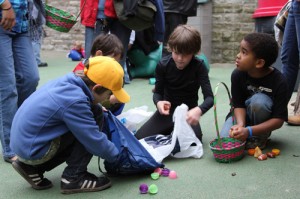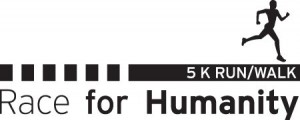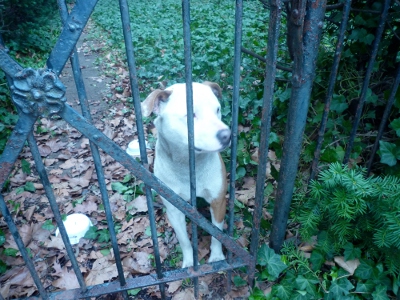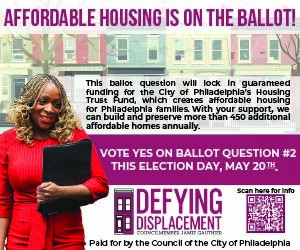Posted on 27 March 2012 by WPL
There are a few Easter egg hunts being held in the neighborhood this and next weekend. If you know of any others, please drop us a line at: editor [at] westphillylocal.com
Saturday, March 31, 3:30 p.m. – Parent Infant Center lawn (42nd & Locust)
This egg hunt is organized by the Woodland Presbyterian Church. Eggs filled with candies and a chance to win prizes for the little ones to hunt!
Saturday, April 7, 1 p.m. – Walnut Street West Library (40th & Walnut)
Children will receive books and stuffed animals. There will be an egg hunt for very young children in an area separate from the older children.

Easter Egg Hunt at St. Mary’s Church (2011).
Saturday, April 7, 3 p.m. – Clark Park (43rd & Chester)
For kids ages 0-8. Rain or shine. The event is free, but the egg hunt spaces are limited. There will be crafts and refreshments for everyone and a raffle prize at the end. There will also be a couple of bunnies to see and pet.
Saturday, April 7, 4 p.m. – St. Mary’s Church (3916 Locust Walk)
On the Nursery School steps (West side). All children and their families are welcome. This is a BYO basket event.
Posted on 26 March 2012 by WPL

University of the Sciences is organizing its 7th annual 5K Race for Humanity on Saturday, March 31. The race begins at 9 a.m. and both runners and walkers are welcome to participate. Registration begins at 7:30 a.m. at the Athletic Recreation Center at 43rd and Woodland Avenue.
Proceeds from the race will go to Livengrin Foundation for Addiction Recovery to support their patient programs and services.
Some of the race features:
Free T-shirts
Refreshments
Water stations along course
Medals for Winners
Timing by Athlete’s Closet
Ample parking and restrooms
Free raffle prizes
For more information and to download the registration form, visit this page.
Posted on 26 March 2012 by WPL
 The Parent Infant Center at 42nd and Locust is holding its annual Spring Plant Sale. They have a great selection of annuals, perennials, herbs, fruits & veggies, and hanging baskets.
The Parent Infant Center at 42nd and Locust is holding its annual Spring Plant Sale. They have a great selection of annuals, perennials, herbs, fruits & veggies, and hanging baskets.
They are currently taking orders for plants until April 15. This year you can place your order and pay online. To see the catalog and to order, click here. And don’t forget to buy a raffle ticket for a chance to win a basket filled with $100 worth of gardening goodies! The plants will be ready for pickup at PIC on Friday, May 4 (4-6 p.m.) and Saturday, May 5 (10 a.m. – 3 p.m.).
Every penny earned through PIC’s Spring Plant Sale supports their scholarship fund. Over the past decade, PIC families have raised nearly $150,000 to provide scholarships to families in the early learning and school-age programs.
Posted on 25 March 2012 by WPL

A reader, Elizabeth, wrote that someone had abandoned this dog in a vacant yard on their block. Elizabeth has been feeding him since yesterday.
Elizabeth called ACCT, but wants to see if someone considers fostering him. She can’t bring him in because she has a dog-aggressive foster dog at the moment. He seems very friendly.
If you want to foster this pooch or you know whose dog it is, please contact Elizabeth at elizabeth.elzer [at] gmail.com.
Posted on 24 March 2012 by WPL
The owners of Han Dynasty, a popular Chinese restaurant with four locations in Philadelphia and the burbs, have reportedly just closed a deal on a West Philly location at 3711 Market Street, the space previously occupied by MidAtlantic Restaurant. We’ll keep you posted on the opening schedule.
The restaurant has recently made the list of the 50 best Chinese restaurants in the U.S., which is no surprise to anyone who has eaten there. “You won’t find General Tso’s in the house, and that’s a good thing,” Eater Philly says.
Posted on 23 March 2012 by Mike Lyons
A 17-year-old West Philly resident faces assault and robbery charges in connection with two gunpoint robberies this week along 50th Street between Hazel and Walton Avenues.
The unnamed teen allegedly held up a woman at gunpoint at about 8:30 a.m. Tuesday near 50th and Hazel and another person yesterday near 50th and Walton, according to police spokesperson Tanya Little.
The victim of Tuesday’s attack said a neighbor found her purse in her yard and guided detectives to a house near 52nd and Cedar “which appeared to be occupied by minors without adult supervision,” she said by e-mail. Police reportedly found her wallet and i-Phone in the house along with evidence from other robberies.
The victim, a 28-year-old woman named Jen, said that the person who stole her wallet on Tuesday used her debit card to buy clothing.
“[He] was wearing the exact designer apparel brands that he purchased via my debit card,” she wrote.












Recent Comments